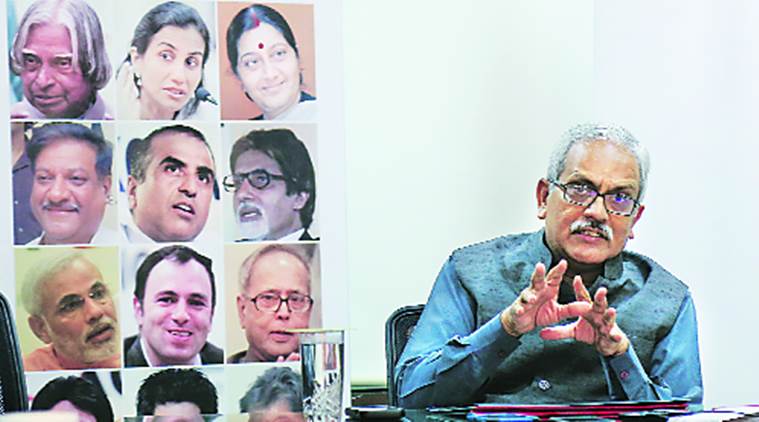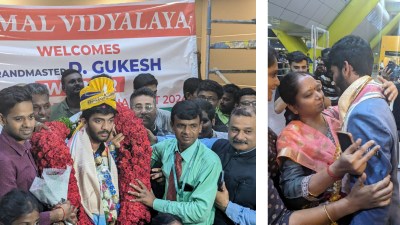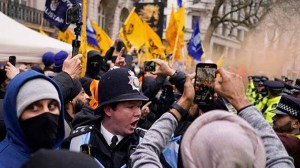- India
- International
‘We have to think of the unthinkable and tackle that’, says Maharashtra DG Satish Mathur
Having taken over as the Maharashtra Director General of Police in July-end, Satish Mathur has already instituted a range of welfare measures for his 2.5 lakh personnel.
 Maharashtra DGP Satish Mathur at The Indian Express office. (Source: Nirmal Harindran)
Maharashtra DGP Satish Mathur at The Indian Express office. (Source: Nirmal Harindran)
From digitising the wireless application protocol to tackling the threat of Islamic State besides sending policemen having lived in landlocked areas all their lives to the high seas, Maharashtra Director General of Police
SATISH MATHUR speaks on a host of issues.
Having taken over as the Maharashtra Director General of Police in July-end, Satish Mathur has already instituted a range of welfare measures for his 2.5 lakh personnel. In his earlier posting, the 1981-batch IPS officer was the head of the Anti-Corruption Bureau at a crucial time, overseeing investigation into high-profile graft cases including against former deputy chief minister Chhagan Bhujbal. Among crucial postings in the past, Mathur was with the CBI and in the team that prosecuted the accused in the 1993 blasts. Apart from CBI, Mathur was also the Director General, Legal and Technical, the first person to hold the post after it was created by the state to improve conviction rates.
Excerpts from an interaction with The Indian Express:
RASHMI RAJPUT: What are the takeaways from the recently concluded DGPs’ conference?
It was a very well structured discussion with ministers from the home department and the PM. The presentations were on varied subjects basically on the technological challenges before the police and some of the threat perceptions. These were the two things selected by the government. People who had some domain knowledge or acquired it gave the presentation with some very fruitful recommendations.
SHAJI VIKRAMAN: What were the soft skills which the Prime Minister spoke about at this conference and how much of that do we see in the police force?
This was what he had spoken last time as well that policing cannot be in the modern day context merely arrests and detection and that we have to win the faith of the people.
KAVITHA IYER: In terms of technology, are there specially any technologies that you are looking to add because when the CM came here last week he also said technology will have to be the new investment to deal with terror.
The government has made a lot of investment in technology. Like one of the most successful is the app-based outreach like ‘Talash’, managed by the Government Railway Police, where you can give your complaints on valuables lost on trains. The other successful app is the ‘Vahan chori takarrar’ where people are registering the complaints on the app, which automatically gets uploaded on a website. The information is accessible to all the police stations. Even if you don’t complain on the app, we put it on the app so that it gets into the database and we come to know whenever it is found somewhere or is involved in some other incident or crime.

SHUBHANGI KHAPRE: There is talk about central command for maritime policing. I guess Home Minister Rajnath Singh discussed it when he was here for the zonal conference?
There was talk of raising a marine police force. Recently, we asked the Navy to train our people here (Mumbai) on sea-tactics because their capacity is full at Karwar. The other day we got about 40 officers who have never seen the sea in Maharashtra and we got them to a jetty and the Navy was kind enough to take them across. There was one qualification for these men — that they should have never stepped into the sea earlier. So we did a survey and all those who have never stepped into the sea where taken. Mumbai Police was ruled out as they all live around the sea. Policemen from the hinterland — Nashik and beyond — in the ranks from DySP to sub-inspectors were taken on board. The idea was to expose our men. They took them up to 20 km into the sea, which is very rare for a police officer in his normal life to go into the high-seas.
RADHIKA RAMASWAMY: What is the status of the de-radicalisation programme in the state?
The government circular will show that it involves many departments but the police have to take the brunt. So … we reach out into various areas and we try to go by behavioural patterns. If somebody is suddenly changing or over a time changing his behaviour. If he is religious then there is nothing wrong with it. Only when he starts getting attracted to violence — and (in) today’s world the benchmark is if he starts thinking of going to Iraq or Syria — then we step in. We keep a watch on the online activities where they are pumping materials that you must do this to be a true believer, there obviously we watch those websites and try to knock them off because the last line of the website is for true belief you have to kill others. That is what we obviously object to. You be a true believer, we cannot legally or even morally object to anybody having faith in his religion.
RASHMI RAJPUT: The chief minister has said 27 youths have been de-radicalised in this exercise. Is there a particular area/region in Maharashtra where you see more of this?
It has been found more in Marathwada … though the internet penetration was not so high in the initial phase. But somehow it has been a little more there… Obviously, the people are dedicated enough to make sure they read material relevant to them. So they have been getting access to it through … anything that connects to the internet.
MOHAMMED THAVER: Why is Marathwada emerging as a hub for radicalised youth?
My personal view is that there is a lack of opportunity for earning money. Basically, the backwardness. In Mumbai, everyone is busy catching the local … so there is no time, but there you have a little more time. Traditionally, it has been a little different from the cosmopolitan cities. So, on both sides there is perhaps a chance. But we are concentrating on that area now.
RASHMI RAJPUT: To have an effective de-radicalisation exercise, you need to first sensitise your police force. There have been instances where the police have not been forthcoming in registering a case or taking up a matter. Do you see that affecting the exercise?
Now most of our senior officers, which means up to sub-inspectors, are fully aware. Some of the work being done at the Anti Terrorism Squad (ATS) is basically by constables who are regularly briefed and we are studying that kind of material.
SMITA NAIR: What are your findings on the SIMI’s ‘re-grouping’, as you call it, because we have been talking about IM being silent for a long time.
They could be. They can be drawn into any of the organisations. We simply keep a watch on ex-SIMI, ex-IM.
RASHMI RAJPUT: But in Marathwada specifically, SIMI had a huge presence and if now IS also has a presence there. Are SIMI men joining IS?
But these (radicalised) boys were not even born when SIMI was banned. If you look at the youth, they are all 18-20 years old and SIMI is much older and gone. It is not like you have to be a member of an organisation to go that way. Internet has finished all that … You can just be sitting at home and … be doing it. You just need to have access to an internet device which connects you to the rest of the world.
MOHAMMED THAVER: Any clarity on the alleged men who had come to Uran and your study based on the incident?
We used it as a practical exercise and are very satisfied with it.
RASHMI RAJPUT: But there were a few hiccups?
No. The SOP was followed. In fact, it exceeded the SOP and the response was fantastic and our job is done. I found it to be an excellent exercise. Especially, there were many people who were new to policing in this area. Everybody came on board and issues which people highlighted during 26/11 were all taken care of seamlessly. So whether it was true or not is not the issue.
SHUBHANGI KHAPRE: Is demonetisation straining your police force?
Our policemen are managing queues and tempers. Everyone gets upset with the police because they can’t reach inside the bank. But the people have also understood the police’s role. For the last one or two weeks, we had pressed at least 50 per cent of our men.
SMITA NAIR: What are the inputs on hawala?
Hawala is finished. The value of the high currency notes abroad is useless.
SMITA NAIR: What is the most challenging lesson for you as of today?
It is terrorism 100 per cent, because it is an unknown force… You don’t know where they are sitting what they are planning. We are constantly updating our knowledge base. Lone wolf attacks are lone wolf, we have to find them. It also depends on his capability v/s ours when it happens.
RASHMI RAJPUT: Do you foresee a repeat of 26/11 or a possibility of lone wolf attack?
I see both. You cannot imagine the mind of the disruptor. Only the unthinkable will happen, the thinkable we will manage. We have to think of the unthinkable and tackle that.
KAVITHA IYER: Is political interference in transfers now a thing of the past?
More or less. I have no complaints at all. They do put in a request, but we evaluate it and take a decision.
SHUBHANGI KHAPRE: There are two authorities, the home and police department. There was always this talk about a power tussle one could see that over the last 10-15 years.
I have been a part of the police for 35 years. But I never saw a tussle. There has been good acceptance of ideas given by us. The repair board for instance. For so many years we have been crying for repairs. I gave the idea. The ACS, in fact, added his bit to it, called the MHADA chief to come immediately, prepare this SOP for repair board, which was not my idea. And within two days, in the next board meeting, it was approved. There is perfect coordination and we hope to see that even with the new ACS there should be no problem. Some of the initiatives have come from the CM himself.
PRIYANKA SAHOO: After the JNU incident earlier this year, there was talk there that the police has increased its presence in educational institutes. Is it true?
Educational institutes are not on watch. We are definitely watching in case there is penetration by any of the banned organisations, which is our duty to watch. And also any ultra organisations which we have identified that may be spreading there.
Apr 25: Latest News
- 01
- 02
- 03
- 04
- 05































